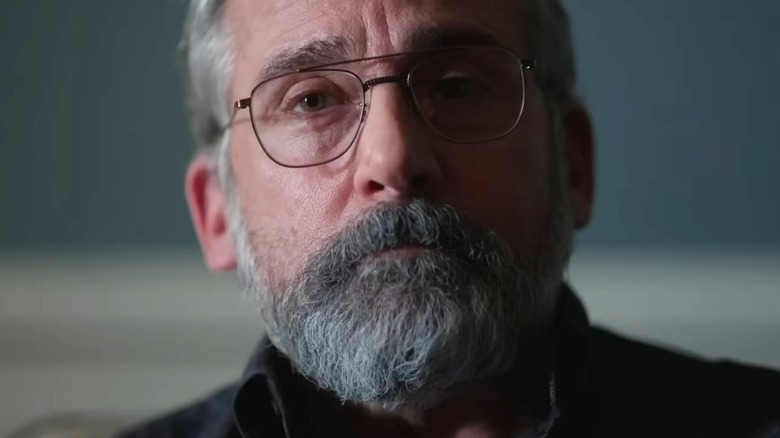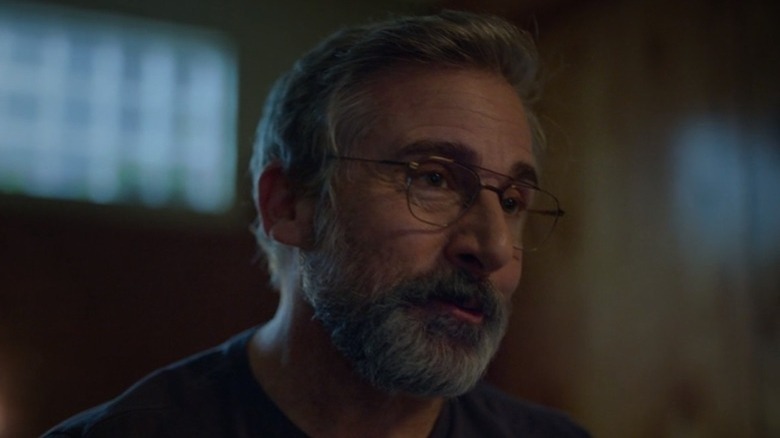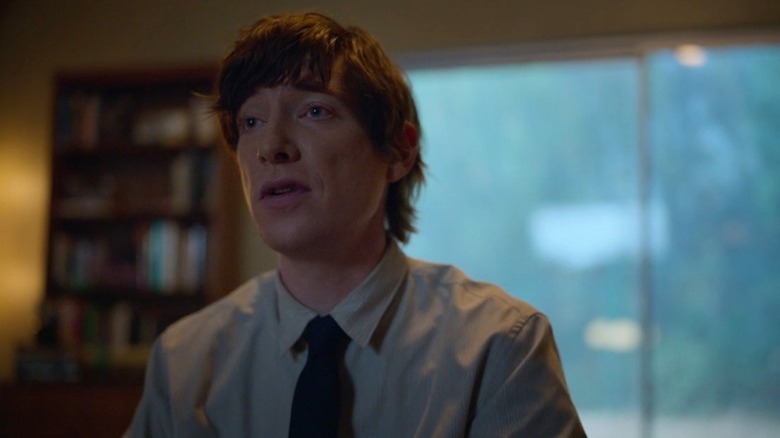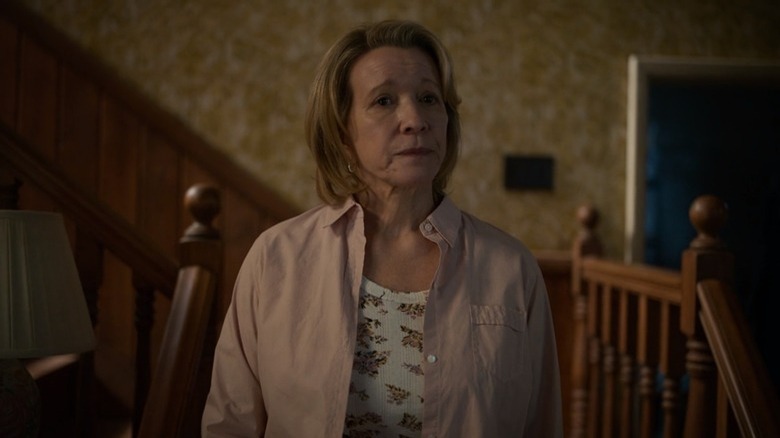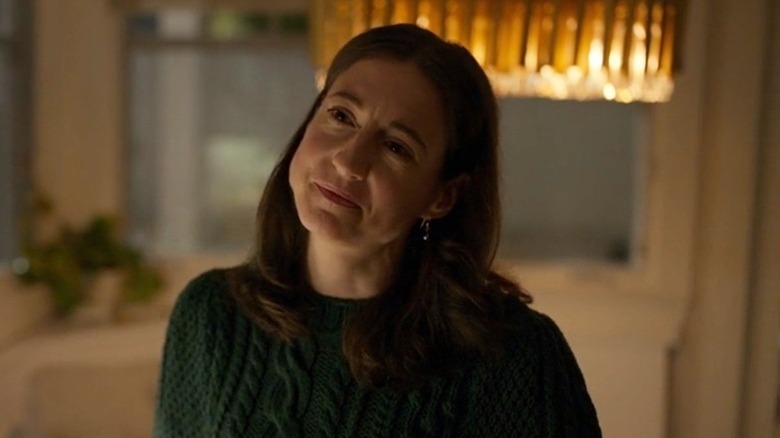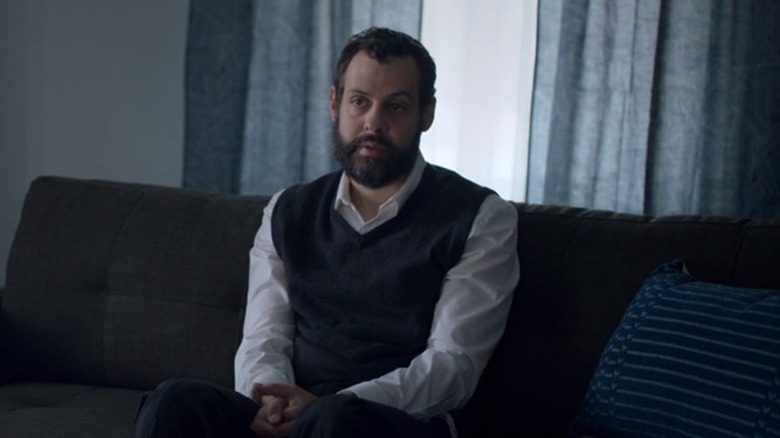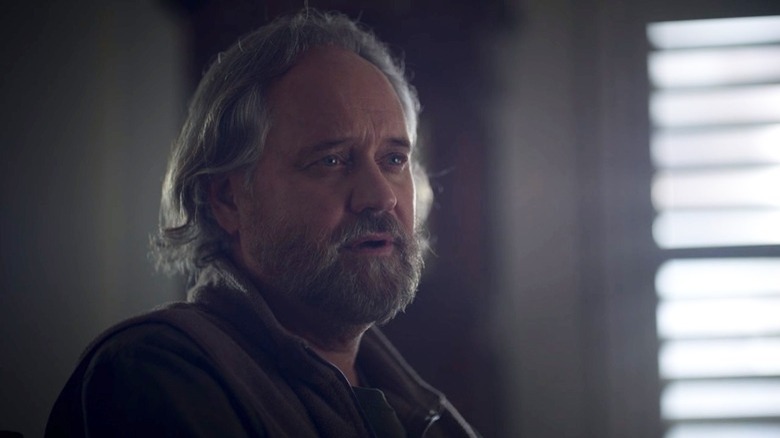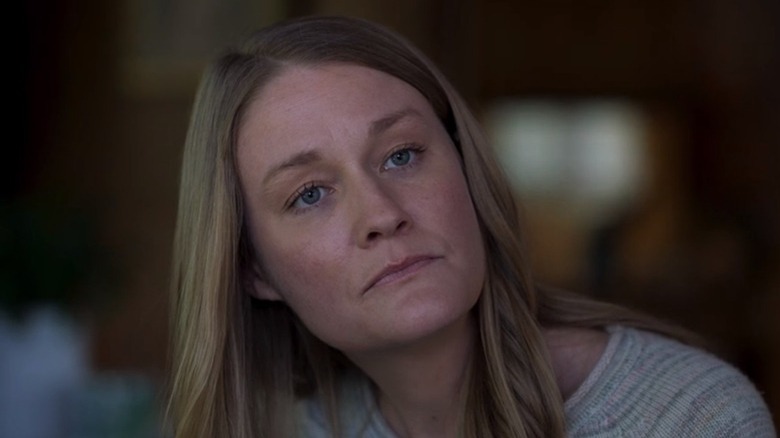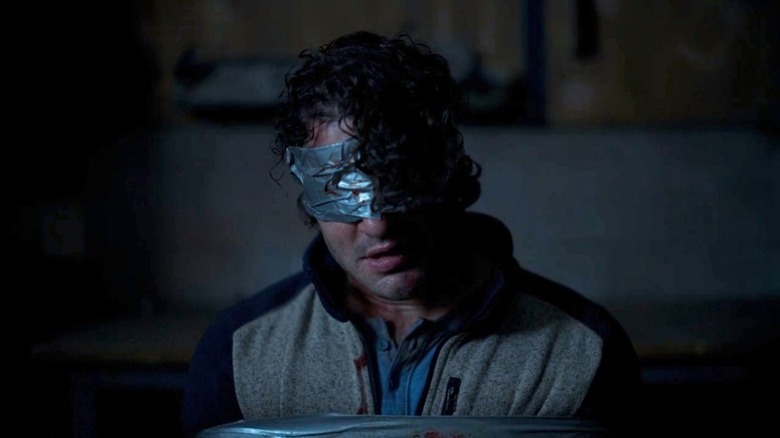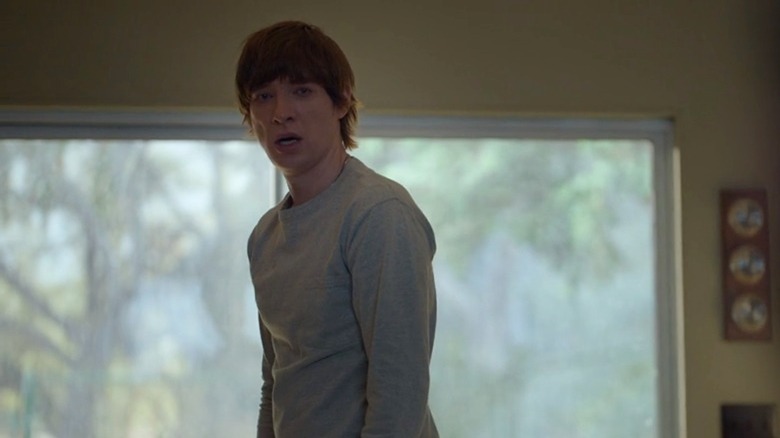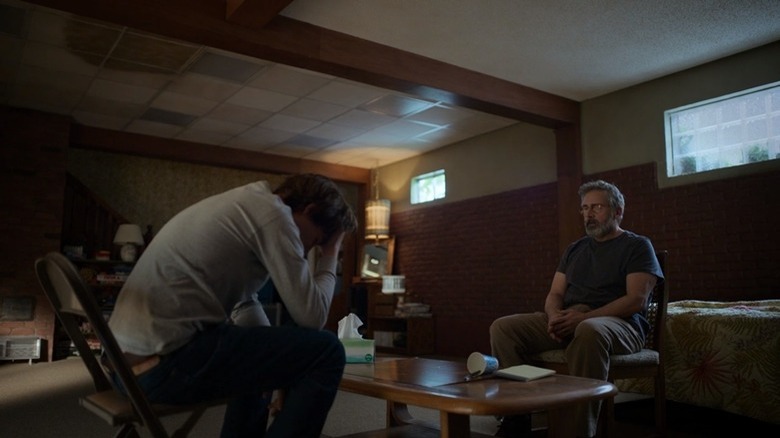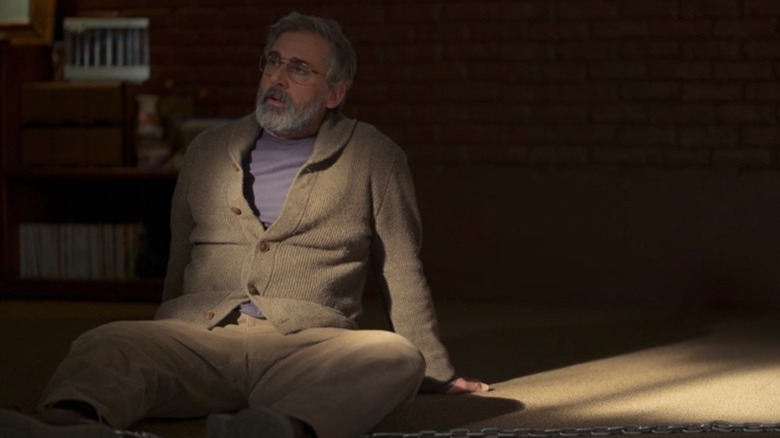The End Of The Patient Explained
Dr. Alan Strauss (Steve Carell) is a man in mourning. His wife Beth (Laura Niemi) died of cancer, and he's struggling to find a way to do more than go through the motions. His relationship with his son is in a rough spot, fueled by Ezra's (Andrew Leeds) conversion to Orthodox Judaism and how that shaped his relationship with his mom during her final days. However, Alan speaks to his daughter Shoshana (Renata Friedman) regularly, connected by their work in mental health.
As a therapist, Alan has a similarly "present but nothing more" disposition. He's good at what he does, but viewers can see a disconnect in his work that likely wasn't there before. Still, he works hard and even takes on a new client, a young man who hides behind a hat and glasses. Soon after beginning this new case, Alan is attacked in his yard and wakes up in a finished basement with a chain around his ankle. The young man, Sam Fortner (Domhnall Gleason), realized he could only tell the doctor the truth under these circumstances. Now that he has the doctor, Sam can reveal all: he's a serial killer but wants to stop. He has decided that Alan will help him stop.
Throughout "The Patient," Alan attempts to do good work with Sam while probing the situation for weaknesses and possible points of escape. It all comes to a head in the season finale, "The Cantor's Husband" — and this is what it all means.
Dr. Alan Strauss' last stand
Alan seems to make progress with Sam, as evidenced by the killer resisting his homicidal impulses and letting go of them for the first time. The doctor validates this and praises Sam's experience, highlighting it as a sign that the abductor and abductee aspect of their therapeutic relationship can finally end. Alas, Sam has other plans. Instead of releasing Alan, he seeks to intertwine their lives further, moving the therapist to the position of father figure. It's classic transference mixed with the threat of murder.
Having exhausted every avenue in his therapist quiver, Alan realizes he must follow the advice of his spectral mentor Dr. Addison (David Alan Grier) and fight for his freedom. Using the foot cream tube he's been sharpening for several episodes, Alan takes Sam's mom Candace (Linda Emond) hostage, demanding Sam call the police or he'll kill her.
The scene suddenly shifts to another Holocaust vision before Alan awakens at his son's house. He made it out. He reconciled with his son. Now Ezra and his family, Shoshana and hers, and Alan are together for a religious celebration. So why is Dr. Addison at the table?
The scene then cuts back to the basement. Sam has his hands around Alan's throat as Candace begs her son to stop. He does not. Alan dies on that basement floor, and that final vision is either a fantasy Alan experiences as he dies or the afterlife opening up to him, depending on your theology.
Sam Fortner's solution
Sam murdering Alan soon after his most significant behavior change since he kidnapped the doctor seems to break something inside the serial killer. While he initially drags Alan's body to the basement grave he forced his therapist to dig earlier in the season, he does not end up burying him there.
Instead, he sends a letter to Alan's home for his survivors to find. In the letter, he discloses Alan's last journal entry and the location of the doctor's body, having learned of the importance of that to Jewish people over the course of the season. Sam also apologizes for what he's done — albeit in a very shallow way.
Sam also does not go forward with his plan to work with his high school therapist Mr. Buchella (Michael Dempsey), something he had mentioned a few episodes earlier as a clear ticking clock threat to Alan. While he never says as much, Sam's disposition implies that he no longer believes he can be "fixed."
Therefore, a few days after he has taken care of Alan's body and sent Alan's family the letter, Sam sits on the bed where he forced Alan to sleep and calls his mother. When she arrives, he locks his own ankle into the chain and hands her the keys. Since he can't be healed and can't stop himself, he'll do the next best thing and chain himself up.
Candace Fortner's ongoing punishment
While it is not entirely clear if Alan means it or is simply saying things to distract and unnerve Candace, Sam's mother must listen to the doctor outright tell her she's an accessory to Sam's crimes. Additionally, she's been failing him since he was a child by not protecting him from his father's violent tendencies. She might not have known what to do, but she nonetheless has responsibility for Sam's abuse as a child and his murders as an adult.
As noted above, it does work enough to help Alan get a hold of Candace and take her hostage. She then must endure being a hostage, having her throat cut — although not fatally — and watching her son murder a man mere feet away from her while never even trying to restrain him.
It's a brutal series of events for a woman whose life has never been easy. What comes next is perhaps the most brutal part, though.
In chaining himself downstairs, Sam essentially makes her his jailer. Since Candace refuses to turn her son in, she will have to spend the rest of her life taking care of him and keeping him under lock and key. If Alan's statements were correct and Candace must bear responsibility for her son's life, then this is apparently her karmic punishment. She can never date again. She can't go on vacations. She can't have friends over. Candance is, in essence, just as trapped as her son.
Shoshana Cohen's tragic discovery
Although most of the "work" Alan needed to do with his family concerned his son Ezra, it is fitting that it is his daughter Shoshana who first finds Sam's letter revealing her father's death and the location of the body.
As Alan says at one point, Shoshana was the child most like him. While he later retracts that a bit to acknowledge how Ezra also resembles him, it doesn't diminish the truth of that first disclosure. Shoshana shared his interests and his more relaxed temperament as an adult. It is his daughter who follows in his footsteps by becoming a doctor as well. Beyond that, it is his daughter whose life and family hewed closest to his values regarding religious doctrine, gender roles, and so on. He even addresses her first in the letter. In the end, it just makes that she, the child with whom Alan could always talk, would be the first to receive the news.
It also enables Shoshana to be there for her brother. While both children are unquestionably sad about their father's death, Ezra's state of mind is more complicated. Thus, the impact of grief is likely thornier. Who better to help him at the moment than his sister, who also happens to work in mental health?
Ezra Strauss gets his reconciliation
As viewers witnessed, Ezra searched for his father following his disappearance. He papered the town in flyers, obviously spending hours doing so. Additionally, the son struggled with his dad's absence, returning to an empty home to play a guitar Ezra had earlier insisted he did not want in what turned out to be his final interaction with his father. While we get very little actual insight into his internal monologue, his external actions suggest that he, too, was wrestling with some of the same issues as his father.
In this way, the final letter is something of a dual gift. The most obvious of these is it has Alan affirming his love for his son. This comforts Ezra, reassuring him that Alan never stopped loving him despite their conflicts.
The letter also sees Alan acknowledge his mistakes and the errors that caused a rift in their relationship. Given that most relationships are rarely "one side good, one side bad," Ezra likely had his own share of guilt, anger, and regret about how his choices affected his relationship with his mom and dad. Alan's letter ensures that Ezra need not feel solely responsible for the changes in the relationship and models a way for the son to accept his failings without it feeling damning.
A final scene between Ezra and his new therapist suggests the amount of healing the letter has already achieved without the son having to confirm it outright.
Sam's dad's luck
When Sam becomes increasingly frustrated with Alan's inability to "fix" him quickly, he turns to the internet. There he encounters a video of an imprisoned serial killer who describes killing and decapitating the person he felt was responsible for his mental health issues. The murderer then went on to insist that after doing so, he felt healed from his homicidal compulsions. The killer believed that act of murder and dismemberment was necessary to get him "healthy" again.
For the increasingly desperate Sam, this sounds like a pretty good plan. To try and follow this suggestion, Sam visits his father (Lance Guest) to settle the score. Unexpectedly, Sam's dad welcomes him into his house. There isn't a lot of warmth between them, but the father neither attempts to get rid of Sam nor lies to pretend that he's thrilled to see his estranged son. There is an honesty to their interaction that's missing from most of Sam's dealings.
Perhaps revealing the source of Sam's food appreciation, his dad immediately gets to work making sandwiches that look both simple in terms of ingredients and delicious in terms of flavors. Sam's father confounds the serial killer further by apologizing for how he treated his son years earlier.
The discomfort of holding this new non-monstrous version of his dad in his head drives Sam to attack the man. Ultimately, however, Sam resists his impulses, takes his hands off his dad's throat, and leaves, sparing his abuser's life.
Mary stays safe
In Episode 9 of "The Patient," Mary (Emily Davis), Sam's ex-wife, becomes unwittingly weaved into the complex tapestry of the show. For Sam, her visit to his and his mom's home for brunch is a chance at reconciliation, redeveloping a connection he thinks may inhibit his desire to kill. For Alan, she's a means of escape. If he can alert her to his presence, she can call the cops and save his life.
Neither man gets what they want. Mary has no desire to be anything more than an annual brunch buddy with Sam. Alan, on the other hand, is too nervous about Mary getting killed at her ex-husband's hands if she learns of his imprisonment.
Sam is upset and confused by Mary's rejection of him. As we've learned during the series, making Sam upset and confused frequently results in a bad end for those responsible. So while Mary leaves the brunch unharmed, it hardly seems like she has escaped danger. After all, Sam knows where his ex lives and works and her general work schedule. If he can't manage his emotions, she could very likely end up as another victim.
"The Cantor's Husband" thankfully resolves this tension. Mary is never seen or heard from, but we know Sam doesn't "visit" her. Additionally, his decision to lock himself in the basement ensures that even if he does wish to take her life, he can no longer follow through on that impulse.
Elias' lonely fate
Back in Episode 5, Sam murdered Elias (Alex Rich) in front of a screaming Dr. Strauss, who could neither reach the young man nor get Sam's mother, Candace, to come down and help. After weeks of working with Sam and "knowing" his client's tendencies, it was the first time Alan truly had to confront the horrible reality of both who Sam was and what fate could await him if he "failed" to help his client to the client's liking.
Alan then tries to find some small good in this situation by convincing Sam to stow the body somewhere he can be found so Elias's family can have some closure. The doctor then hides a note in Elias's mouth, hopeful that it will lead police to Sam's house once Elias is discovered. Unfortunately, Sam changes his mind after leaving with the corpse and opts to put it somewhere, as he assures Alan, that no one will ever find it.
By the series' end, this remains true. Elias's family receives no such closure. The note remains undiscovered, neither saving Alan nor revealing Sam's crimes. The mercy Sam opts to show the Strauss family is never retroactively applied to Elias or his family.
The creators' take
Both Alan's death and Sam's evasion of responsibility for that or any of the other murders will likely disappoint and upset some viewers. Despite that, neither creator Joe Weisberg nor Joel Fields — previously of "The Americans" — felt hesitant about the choice.
As Weisberg explained to Deadline, Alan's death was their "initial instinct." They did consider several conclusions "that we talked about, that we wrote, that we experimented with, that we acted out for each other." However, their first instincts held up and ultimately, they felt Alan's fate was "the most true, the most authentic and meaningful to us."
They also considered what should happen to Sam, although possible capture by the police was never really on the table, according to Weisberg. Again, however, they pointed to what made the most sense in the context of the story. Fields asserted in that same Deadline piece, "We had a lot of discussions about what we owe, what we have set up for the audience so they can have reasonable expectations and what we are going to tell them."
In the end, Sam's decision to lock himself up, imprisoning his mother in a way, at the same time, made for a more sensible conclusion to the Sam piece than having him captured at the last moment. "That felt true," Fields reiterated.
The actors' response
While the creators may have always known that the series had to end with Alan dying, the man playing Alan did not. "I was shocked to read it," Steve Carell admitted to USA Today.
The actor's surprise, however, does not mean he disagreed with the choice. Carell did read a few different possible endings, outcomes creator Joel Fields doesn't wish to discuss lest "people will like one of them better!" However, the actor feels right about what viewers saw. He explains the chosen conclusion is "a harder one to digest, but in a weird way, it's more satisfying."
Actor Domhnall Gleeson was similarly pleased with where his character Sam ended up. "I was relieved because one of my concerns all the way through was wanting to make Sam a real person, a human who was trying to get better," he said to Vanity Fair. "And yet it really mattered to me that he was held to account at the same time, that he didn't just become a good person through therapy and we forget his past ills. I was happy that that element of his nature, which is almost impossible to understand, was not sorted out after 10 therapy sessions."
The Patient's future
One would expect that Alan's fate makes the future of "The Patient" reasonably clear. After all, how do you have Season 2 of a show that ends with the protagonist's family mourning his killing?
On the other hand, though, the series is called "The Patient," not "The Doctor" or "The Therapist." As Sam remains very much alive at the season's end, it is not impossible to imagine future stories worth telling about him. This is especially the case considering the status quo change between him and his mother brought on by his decision to put himself in a leg iron, trapped in the same small space he subjected Alan to for weeks.
As intriguing as that might be for some, however, it must remain fodder for personal imagination and, possibly, fan fiction. In Deadline, creator Joe Fields made the original plan for "The Patient" clear when he stated, "It was a really great experience, but it was always intended as a one-season story." Making it did not change their minds either, he acknowledged. "We were ready to say goodbye."
